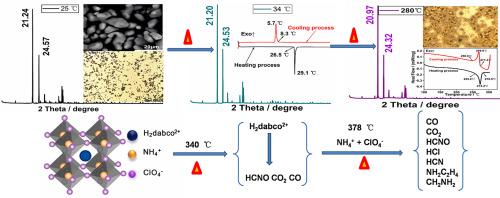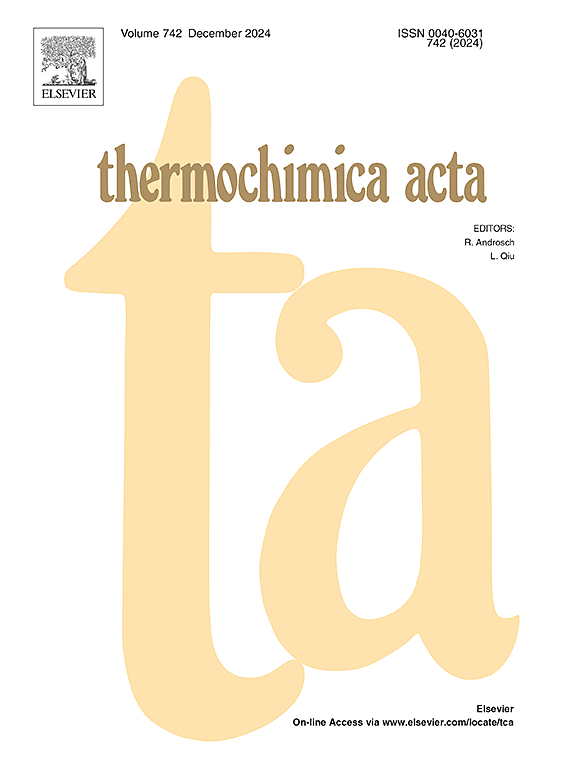过氧化物高能材料 (C6H14N2) NH4 (ClO4)3 的热性能和分解过程
IF 3.1
2区 化学
Q2 CHEMISTRY, ANALYTICAL
引用次数: 0
摘要
(C6N2H14) NH4 (ClO4)3 (DAP-4)作为一种以高氯酸铵为基础的分子包光体高能材料,其卓越的特性最近引起了越来越多的关注。本研究采用显微镜、变温 X 射线衍射、原位红外光谱、差示扫描量热法-热重法同时热分析耦合红外光谱和质谱(DSC-TG/FTIR/MS)技术,系统研究了 DAP-4 从 -40 ℃ 到 550 ℃ 的热性能。结果表明,DAP-4 有两个固-固结晶相变,熔化过程不具特征性。生成的 HCN、CO、CH2NH2、CO2 和 NO2 气体产物的活化能均低于 DAP-4 的宏观分解能。这一发现有力地证明了 DAP-4 在热刺激过程中很容易形成这些气体产物。在高纯度氩气条件下,提出了伴随大量 CH2NH2 和 NH2C2H4 气体的两阶段分解机理以及 DAP-4 的动力学模型。这项研究为深入准确地描述作为潜在高能材料的 DAP-4 的热分解机理提供了新的视角。本文章由计算机程序翻译,如有差异,请以英文原文为准。

Thermal properties and decomposition of perovskite energetic materials (C6H14N2) NH4 (ClO4)3
(C6N2H14) NH4 (ClO4)3 (DAP-4) have attracted an increasing focus recently as an ammoniumperchlorate-based molecular perovskite energetic material with outstanding features. Microscopy, variable temperature X-ray diffraction, in situ infrared spectroscopy, differential scanning calorimetry-thermogravimetry simultaneous thermal analysis coupled with infrared spectroscopy and mass spectrometry (DSC-TG/FTIR/MS) techniques were used to systematically investigate DAP-4 thermal properties from -40 °C to 550 °C. The results revealed that DAP-4 have two solid-solid crystallization phase transitions with a non-characteristic melting process. The generated activation energies of HCN, CO, CH2NH2, CO2 and NO2 gas products are all lower than the macroscopic decomposition's of DAP-4. This finding strongly proves that DAP-4 is easy to form these gas products during thermal stimulus. The two stages decomposition mechanism accompanying a large of CH2NH2 and NH2C2H4 gases and kinetic model of DAP-4 were proposed under the condition of high-purity argon gas. This study provides new insight into the in-depth and accurate description thermal decomposition mechanism of DAP-4 as a potential energetic material.
求助全文
通过发布文献求助,成功后即可免费获取论文全文。
去求助
来源期刊

Thermochimica Acta
化学-分析化学
CiteScore
6.50
自引率
8.60%
发文量
210
审稿时长
40 days
期刊介绍:
Thermochimica Acta publishes original research contributions covering all aspects of thermoanalytical and calorimetric methods and their application to experimental chemistry, physics, biology and engineering. The journal aims to span the whole range from fundamental research to practical application.
The journal focuses on the research that advances physical and analytical science of thermal phenomena. Therefore, the manuscripts are expected to provide important insights into the thermal phenomena studied or to propose significant improvements of analytical or computational techniques employed in thermal studies. Manuscripts that report the results of routine thermal measurements are not suitable for publication in Thermochimica Acta.
The journal particularly welcomes papers from newly emerging areas as well as from the traditional strength areas:
- New and improved instrumentation and methods
- Thermal properties and behavior of materials
- Kinetics of thermally stimulated processes
 求助内容:
求助内容: 应助结果提醒方式:
应助结果提醒方式:


